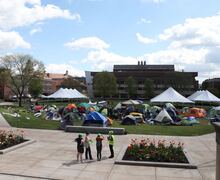Syracuse University’s free speech policies should be clarified, centralized
Syracuse University policies regarding freedom of speech should be straightforward and easily accessible for all members of the university community.
A workgroup on free speech delivered its report to Chancellor Kent Syverud at the end of September. Though not yet released to the public as of Tuesday, the report calls on the university to make speech policies readily available in a centralized form and includes recommendations for navigating the ways in which speech should be restricted on the SU campus.
The current state of speech polices at SU lacks transparency, and The Daily Orange Editorial Board agrees with the workgroup’s recommendations that the university has the right to end instances of assembly when they hinder the educational mission. These recommendations, if paired with a move toward clarity on behalf of the administration, would be a progressive way to ensure that these policies are clearly and fully disclosed to students.
“The university need not tolerate the occupation of any space that is not deemed part of the public forum, such as a dormitory, a classroom building, the library, a dining commons, and so on,” the report says.
The recommendation is valid — for the university to shut down instances of assembly that are intrusive to academic environments would preserve educational resources for students who are paying to attend educational spaces free of protests.
In November of last year, THE General Body, a coalition of student organizations, held an 18-day sit-in in Crouse-Hinds Hall — SU’s main administration building that also hosts classrooms.
While it is unclear at this time if the group was hindering SU’s educational mission by the workgroup’s standards, having explicit designations of place, such as campus buildings, where students can and cannot assemble in exercises of speech would be beneficial for the university moving forward.
The clarification and centralization of SU’s speech policies would ensure that resources are available at all times for on-campus groups that may be organizing activist demonstrations and for students, faculty or staff who may feel their rights have been violated in any way in regard to speech.
Although the university has plans in place to release the workgroup’s report in its entirety, it should not have taken almost two months for the document to become available, considering the recommendations are dated Sept 23.
Moving forward from the report, the university should work to compose a central resource for its speech policies and ensure that these policies clearly define SU’s institutional standards for restricting speech on campus.
Published on November 11, 2015 at 12:50 am
Contact: [email protected]




